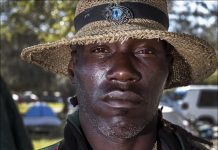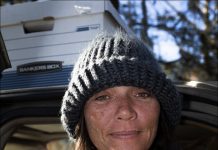By Edysmar Diaz-Cruz
Published July 20, 2020
GAINESVILLE, Fla. — Underneath a canopy of trees, a dirt path leads to a makeshift home. An American flag marks the entrance and a yellow diamond-shaped sign issues a stern warning to all guests: “Pitbull on Guard.” The slightest sound, like the crunch of fallen leaves, sets off a startling and effective alarm system. A cacophony of barking, deep and protective in tone, alerts Ramona Seay and her fiancé, Keith Ratchford, of the presence of others.
Every morning, Seay emerges from the home she and Ratchford built in the woods and greets their six pit bulls: Buddy, Storm, Mary, Twister, Razzy and Legend.
The couple dedicates their lives in Dignity Village to rehabilitating abused and malnourished dogs. While canines are loyal companions to the homeless, sometimes they get left behind. Seay and Ratchford built a fence out of wood pallets and metal wires to keep their dogs safe.
“We’ve built our own castle out here,” Seay says, looking at her campsite. Each dog has a tent that shelters it from rain and sun.
Taking care of the dogs takes up two hours of Seay’s morning routine. They must be fed, walked and entertained. Some dogs require socializing to calm their aggression while others require physical therapy for their ailing joints. Afterward, Seay tackles her daily to-do list. It’s a long one, and she can’t afford to rest until she’s done. Being homeless can be hard work.
She rides her bike to Walmart, where she buys groceries and dog food. She collects silver trinkets and other junk scattered around the Dignity Village compound to sell at secondhand stores. At the GRACE Marketplace shelter, she and Ratchford collect water in empty milk jugs and take them back to their campsite for cooking, washing the dishes and bathing their dogs.
On laundry day, Seay ties three trash bags full of clothing and stacks them onto a shopping cart. She’s a petite woman with thin arms, but her biceps bulge as she lunges forward to keep the wheels from getting stuck in the earth. She brushes her black, curly hair away from her blue eyes and pushes the cart up a hill and out of her campsite. As she nears the community laundry room, she angles her shoulders for one final thrust, forcing the cart through a hole in a fence that separates the tent city from GRACE Marketplace.
By the end of it all, Seay is out of breath.
The sun hangs low when she finally returns home for dinner with Ratchford, who jokingly insists she eats like a 300-pound woman. She attributes her massive appetite to her high metabolism, but Ratchford is convinced she simply loves to eat. Seay does not deny this. She looks forward to dinner and is proud of the meals she makes. At Christmas last year, she made a chicken pot pie from scratch, slowly steamed over a fire. On days when they can only afford canned foods, Seay closes her eyes and tries not to think about it.
Legend is usually the first to greet Seay when she comes home. He barks incessantly, baring his teeth and gums while tugging on the rope that keeps him bound. The muscles underneath his grey fur make him look large and threatening.
“Aye! You can’t bark and wag your tail at the same time,” Seay says.
Seay found Legend tied to a pile of trash in the woods and he had trouble walking on his own. She suspected he had severe hip dysplasia and spent several months massaging his joints. Now that his pain has faded, he greets her with his whole body.
“You can’t be lazy and be homeless — not with dogs,” Ratchford says. “It’s like a job.”
After three years, Seay has lost count of the number of dogs they’ve nursed back to health, including a litter of puppies. She welcomes all kinds of breeds, but loves pit bulls in particular. They are misunderstood. People, she says, can learn a lot from them — strength, perseverance, unconditional love.
“These babies are my calling,” she says. “These guys do not have anybody to stand up for them. It’s what God kept me here for.”
She likens her household to a farm. Every once in a while, she and Ratchford lead the dogs deep into the woods and allow them to roam free. They chase deer and foxes. And they love to swim.
The thought of parting with the dogs breaks Seay’s heart. The dismantling of Dignity Village means many residents will have to move into an enclosed area of the GRACE compound. Seay and Ratchford had to think hard about where they would go. How would they possibly move inside if it meant taking away their dogs’ freedom?
Luckily, a friend offered them his truck and the couple plans to move to another plot of woods elsewhere in Gainesville. They hope to recreate their campsite there.
“We don’t always agree on everything, but in the end, we always get it done,” Seay says.
As Ratchford starts taking apart the fence, Seay feeds the dogs. Their to-do-list only grows longer, but it’s worth upending their makeshift home if it means they get to keep their canine friends close.





